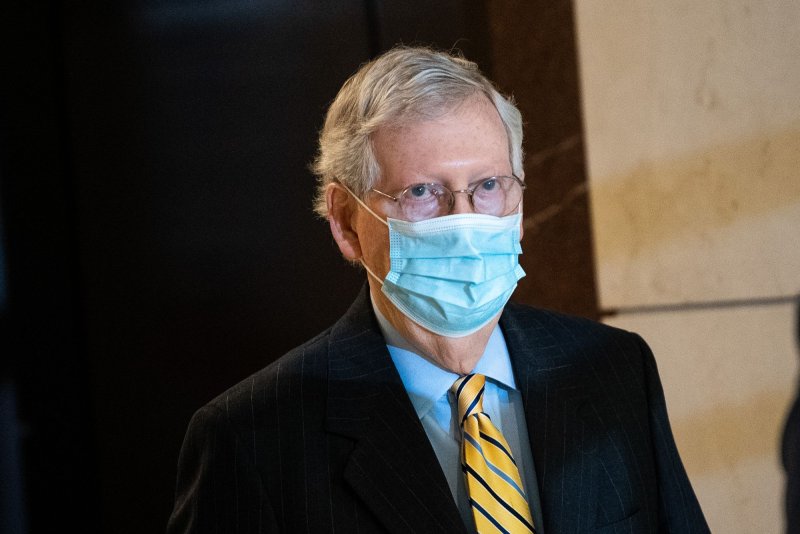Senate Majority Leader Mitch McConnell, R-Ky., shown here at a briefing at the U.S. Capitol in Washington, DC , July 2, on Monday unveiled a coronavirus relief package that includes $29 billion in defense spending. Photo by Kevin Dietsch/UPI |
License Photo
July 28 (UPI) -- The new coronavirus relief package proposed in the U.S. Senate includes $29 billion for the Department of Defense, including at least $7 billion for weapons programs and $11 billion to reimburse defense contractors for coronavirus-related expenses.
Defense contractors lobbied for the reimbursement funding, saying the Department of Defense would otherwise be forced to tap into modernization and readiness accounts.
The Senate bill was unveiled Monday and includes another stimulus payment for Americans and a cut to unemployment benefits. The bill also includes a new round of funding for the Paycheck Protection Program, more money for emergency business loans and a reduced extension of emergency federal unemployment benefits.
Its release follows weeks of negotiation between the White House and congressional Republicans over the bill's price tag.
Now Republicans and Democrats will begin formal negotiations over the bill's particulars.
Republicans have argued the bill's defense spending is essential for the economy and for national security but Democrats have criticized the bill on multiple fronts.
Sen. Patrick Leahy (D-Vt.) released a statement Monday saying the bill is inadequate to support health and safety and stabilize the U.S. economy during the pandemic.
The bill, Leahy said, "contains billions of dollars for programs unrelated to the coronavirus, including over $8 billion for what appears to be a wish-list from the Department of Defense for manufacturing of planes, ships, and other weapons systems, as well as $1.75 billion to build a new FBI Headquarters."
"What does this have to do with the immediate crisis?" Leahy wrote. "The bill provides nothing to address the long lines at foodbanks and shortchanges education and childcare, but we can shore up the defense industry? I am at a loss for words."
On Tuesday Rep. Adam Smith (D-Wash.), chairman of the House Armed Services Committee, issued a statement criticizing the DoD line items.
"While it is true that COVID-19 poses a real and credible threat to our national security, you don't have to be doctor or a four-star general to understand that spending billions on new helicopters, combat vehicles, and fighter jets is not the solution to this complex problem," Smith wrote.
"It is also true that COVID-19 has had a disproportionate impact on small manufacturers who play a crucial role in our industrial base," Smith wrote. "We need to implement smart policies that actually support these small manufacturers and maintains the stability of our supply chain -- Leader McConnell's procurement wish list is not the solution."
The legislation left out some items on the White House's wish list, including a payroll tax cut President Donald Trump has demanded.
It also restores hundreds of millions of dollars in defense spending that the Trump administration had redirected to pay for construction of a wall along the southern border of the United States.
The Trump administration's use of Pentagon funds for border wall construction has been a subject of dispute between the White House and Congress.
At the end of June a federal appeals court ruled that the Trump administration doesn't have the authority to divert $2.5 billion in military funds to carry out construction of the border wall.
Earlier this month House Democrats released a draft of the Homeland Security funding bill designed to block funds for the border wall. It was reviewed by the House Appropriations Committee last week but has not passed.















